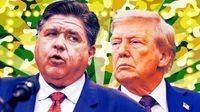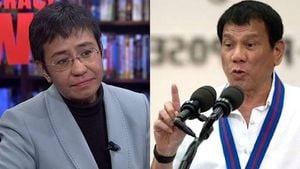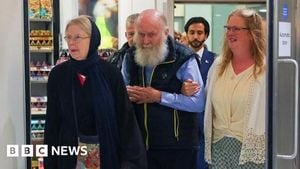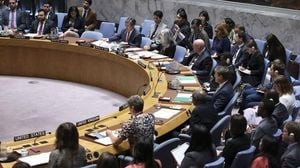On September 2, 2025, the simmering tensions between the White House and Chicago’s leadership reached a boiling point as President Donald Trump declared his readiness to deploy federal authorities—including National Guard troops—to the nation’s third-largest city. The move, framed by the president as a necessary step to combat crime, has set off a political firestorm and prompted fierce pushback from Illinois Governor J.B. Pritzker, Chicago Mayor Brandon Johnson, and other local leaders.
"We’re going in," Trump proclaimed during a wide-ranging press conference in the Oval Office, according to NBC Chicago. He insisted, "I have an obligation. This isn’t a political thing." The president’s remarks followed a spate of shootings over the Labor Day weekend in Chicago, where eight people were killed and 50 wounded in 37 separate incidents, as cited by Chicago police data. Trump argued that the city is "less safe than Afghanistan" and described Governor Pritzker as a "terrible governor," blaming him for refusing to request federal assistance and, in Trump’s view, making Chicago’s residents less safe.
The president’s plan, however, has been met with outright rejection by Illinois officials. Governor Pritzker, speaking at a press conference just hours after Trump’s announcement, scoffed at the idea of military intervention. "I’m aware that the President of the United States likes to go on television and beg me to call and ask him for troops," Pritzker said, as reported by Newsweek. "I find this extraordinarily strange as Chicago does not want troops on our streets." He continued, "I refuse to play a reality game show with Donald Trump again."
The back-and-forth between the federal government and Illinois began in earnest on August 30, when the head of the Illinois State Police received a call from Gregory Bovino, chief of the Border Patrol’s El Centro, California, sector. According to Governor Pritzker, this was the first direct contact from federal authorities regarding possible intervention. The situation escalated quickly: by September 1, reports indicated that armed federal agents and military vehicles were being staged on federal property, notably at the Great Lakes Naval Base. Pritzker told NBC Chicago, "It is likely those agents will be with ICE, Customs and Border Patrol, the Department of Homeland Security and other similarly situated federal agencies. Many of these individuals are being relocated from Los Angeles for deployment in Chicago. We believe that staging that has already begun started yesterday and continues into today."
In an exclusive interview with NBC Chicago, Pritzker warned, "We expect to see what has played out in Los Angeles and Washington, D.C., to happen here in Chicago." The governor confirmed that Immigration and Customs Enforcement (ICE) agents would be conducting enhanced immigration enforcement operations in the city in the coming days, raising concerns that these actions could disrupt Mexican Independence Day celebrations—a cherished event for Chicago’s Latino communities. "We have reason to believe that Stephen Miller chose the month of September to come to Chicago because of celebrations around Mexican Independence Day that happen here every year," Pritzker noted, suggesting the timing was no accident. "It breaks my heart to report that we have been told ICE will try and disrupt community picnics and peaceful parades. Let's be clear: the terror and cruelty is the point, not the safety of anyone living here."
Chicago Mayor Brandon Johnson echoed the governor’s sentiments, reiterating that neither the city nor the state wanted troops deployed. "The vast majority of guns do not come from Chicago. They are not made in Cook County. They are not bought in the state of Illinois. These guns come from red states," Johnson said, referencing Indiana, Mississippi, and Louisiana as primary sources of illegal firearms. "Chicago will continue to have a violence problem as long as red states continue to have a gun problem." Johnson argued that federal efforts should focus on stemming the flow of guns rather than occupying the city with troops. "Occupying our city will do nothing to solve this problem," he asserted.
Despite the tough talk from Washington, the deployment of National Guard troops to Chicago remained unconfirmed as of September 2. A spokesperson for the Illinois National Guard stated, "We don't have an order for a mission in Chicago." Meanwhile, sources in the Texas governor's office denied reports that the Texas National Guard was being staged for deployment in Illinois. Still, the Trump administration reportedly planned to send National Guard members to Chicago in a manner similar to recent deployments in Washington, D.C.
The legality of such a move is under intense scrutiny. Pritzker and other Illinois officials argue that deploying National Guard troops for law enforcement purposes would violate the Posse Comitatus Act, a 19th-century law that restricts the use of military assets in domestic law enforcement. This argument gained traction after a federal judge in California ruled that the Trump administration’s deployment of the National Guard to Los Angeles during June protests was illegal. Illinois Attorney General Kwame Raoul weighed in, stating, "'We're going in' is not enough," and indicated that Trump’s statements alone did not provide sufficient grounds to initiate legal proceedings before operations commence.
Pritzker also warned of the potential for provocation, urging residents to remain peaceful in the face of any federal deployment. "We know, before anything has happened here, that the Trump plan is to use any excuse to deploy armed military personnel to Chicago. If someone flings a sandwich at an ICE agent, Trump will try and go on TV and declare an emergency in Chicago," he cautioned. "I'm imploring everyone, if and when that happens, do not take the bait." The governor’s remarks reflect a deep mistrust of the administration’s motives, which he characterized as political theater rather than genuine concern for public safety. "He’s testing his political power and producing a political drama to cover up for his corruption," Pritzker alleged.
For many Chicagoans, the prospect of masked, unidentified agents in unmarked vehicles—reportedly planning raids in Latino neighborhoods—has stoked anxiety and outrage. Pritzker’s warning that "the terror and cruelty is the point, not the safety of anyone living here" struck a chord with community leaders and residents alike, particularly given the city’s history of contentious federal interventions.
Despite the heated rhetoric and uncertainty, one fact remains clear: while overall violent crime in Chicago has dropped significantly, according to city data, it persists in certain neighborhoods. The debate over how to address this reality—whether through federal force or local reform—continues to divide leaders at every level. As the city braces for what may come, the eyes of the nation are fixed squarely on Chicago, wondering what the next move will be in this high-stakes political standoff.
The coming days are likely to test not only the resolve of Chicago’s leaders but also the boundaries of federal authority and the resilience of the city’s communities. For now, Chicago waits—uneasily—on the edge of a decision that could reshape the relationship between local and federal power for years to come.




